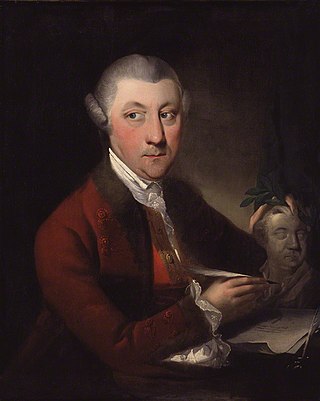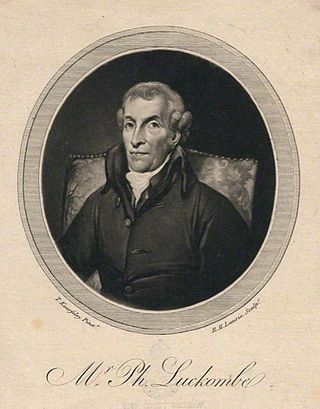Related Research Articles

David Garrick was an English actor, playwright, theatre manager and producer who influenced nearly all aspects of European theatrical practice throughout the 18th century, and was a pupil and friend of Samuel Johnson. He appeared in several amateur theatricals, and with his appearance in the title role of Shakespeare's Richard III, audiences and managers began to take notice.

Colley Cibber was an English actor-manager, playwright and Poet Laureate. His colourful memoir An Apology for the Life of Colley Cibber (1740) describes his life in a personal, anecdotal and even rambling style. He wrote 25 plays for his own company at Drury Lane, half of which were adapted from various sources, which led Robert Lowe and Alexander Pope, among others, to criticise his "miserable mutilation" of "crucified Molière [and] hapless Shakespeare".

Susannah Maria Cibber was a celebrated English singer and actress. She was the sister of the composer Thomas Arne. Although she began her career as a soprano, her voice lowered in the early part of her career to that of a true contralto. She was universally admired for her ability to move her audiences emotionally both as an actress and vocalist. Possessing a sweet, expressive, and agile singing voice with a wide vocal range, Cibber was an immensely popular singer, even if at times her voice was criticized for a lack of polished technique. Charles Burney wrote of her singing that "by a natural pathos, and perfect conception of the words, she often penetrated the heart, when others, with infinitely greater voice and skill, could only reach the ear." Cibber was particularly admired by Handel, who wrote numerous parts especially for her including the contralto arias in his 1741 oratorio Messiah, the role of Micah in Samson, the role of Lichas in Hercules and the role of David in Saul among others. In the mid-1730s she began appearing in plays in addition to appearing in operas and oratorios. She became the greatest dramatic actress of the eighteenth-century London stage and at the time of her death was the highest-paid actress in England.
This article contains information about the literary events and publications of 1726.
This article contains information about the literary events and publications of 1736.
This article contains information about the literary events and publications of 1743.

Theophilus Cibber was an English actor, playwright, author, and son of the actor-manager Colley Cibber.

Charlotte Charke was an English actress, playwright, novelist, and autobiographer. She began acting at the age of seventeen in breeches roles, and took to wearing male clothing off stage as well, performing and being publicly known as "Charles Brown" from 1741. Her later career and her writings were conducted under her own name, "Mrs. Charlotte Charke", and identified her as the daughter of Colley Cibber. After being unsuccessful in a series of jobs associated with men at the time, such as valet, sausage maker, farmer, and tavern owner, she succeeded in her career as a writer and continued her work as a novelist and memoirist until her death in 1760.

Robert Wilks was a British actor and theatrical manager who was one of the leading managers of Theatre Royal, Drury Lane in its heyday of the 1710s. He was, with Colley Cibber and Thomas Doggett, one of the "triumvirate" of actor-managers that was denounced by Alexander Pope and caricatured by William Hogarth as leaders of the decline in theatrical standards and degradation of the stage's literary tradition.

Catherine Clive Catherine ‘Kitty’ Clive was a first songster and star comedienne of British playhouse entertainment. Clive led and created new forms of English musical theatre. She was celebrated both in high-style parts – singing, for instance, Handel’s music for her in Messiah, Samson, and The Way of the World – and in low-style ballad opera roles. Her likeness was printed and traded in unprecedented volume. She championed women’s rights throughout her career.
Richard Charke was an English violinist, composer, operatic baritone, and playwright.
Thomas Elrington (1688–1732), was an English actor.

Thomas Hull (1728–1808) was an English actor and dramatist.
John Leigh (1689–1726) was an Irish actor and dramatist.

Thomas Walker (1698–1744) was an English actor and dramatist.

Philip Luckombe was an English printer and author.
A Wife to be Lett is a 1723 comedy play by the British writer Eliza Haywood. Better known for her novels, it was Haywood's first theatrical play.

The Provoked Husband is a 1728 comedy play by the British writer and actor Colley Cibber, based on a fragment of play written by John Vanbrugh. It is also known by the longer title The Provok'd Husband: or, a Journey to London.
Love in a Forest is a 1723 comedy play by Charles Johnson. It is a substantial reworking of Shakespeare's As You Like It cutting out characters and passages, while borrowing from other Shakespeare plays amongst other things.

The Rival Fools is a 1709 comedy play by the British writer Colley Cibber. It drew inspiration from the earlier play Wit at Several Weapons. Despite Cibber's previous record of turning out hits, it was not a great success.
References
- Burling, William J. (2004). "Chetwood, William Rufus (d. 1766)". Oxford Dictionary of National Biography (online ed.). Oxford University Press. doi:10.1093/ref:odnb/5247.(Subscription or UK public library membership required.)
- Knight, John Joseph (1887). . In Stephen, Leslie (ed.). Dictionary of National Biography . Vol. 10. London: Smith, Elder & Co.